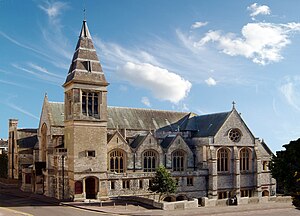I am sure Archbishop Ganswein used the term 'expanding papacy' to mean simply a changing or developing papacy: de facto the Papacy has changed since the First Vatican Council. De facto Pope Benedict's resignation was the key change. Ganswein describes Benedict as homo historicus, quite what he means I don't know but Benedict has the clarity of vision to see what is likely to happen in the future. I am sure he expected the St Gall mafia's candidate to be elected. I am sure he understood the inevitable confusion that would result. I am sure he would look beyond his papacy to the next and beyond. One of the principles that seems to be at the basis of Benedict's thought is that truth will triumph, because Christ is truth.
Benedict has introduced the idea of a Pope not dying in office, he himself promising obedience retired to a Vatican monastery and has rarely broken his silence. The important question is not what Benedict will do but what would Francis do if retired or was forced from office. Presumably he would not retire to life of prayer but probably become a curate in some poor South American parish, would he remain quiet? It is highly unlikely, and probably impossible for him.
With a chatterbox former-Pope giving daily interviews with Scalfari or some other journalist of choice, or just picking up the phone and sharing his ideas with anyone in the world he wants to - well this produces a very interesting slant on an 'expanded papacy'. Not only will the Cardinals in the future be electing a Pope but also someone who might in just a few years become an ex-Pope.
John Paul set down strict rules about forbidding lobbying amongst Cardinals, human nature would suggest this unreasonable. I am sure wherever two are three Cardinals are gathered, and they have kicked their shoes off they start talking about who is likely to be the next Pope, and who is likely to vote for who. For the good of the Church it would be irresponsible not to do so. In the same way I am sure any conversation between Cardinal is a bit like a job interview - with the under-riding idea of will this man be a suitable next Pope.
I think one of the things that could well develop is a fixed term papacy, an expectation that the Pope will retire after five or six years or when he has reached 80 or 85 he will become a former-Pope. Would it be possible that with two or three pope's emeritus around they develop a particular role, as advisers to the reigning Pope? I rather like the idea of retired Popes Home with popes in vary states decrepitude eager to advise their successor, whilst they scheme and skype friends in the media, some maybe doing an occasional television interview or 'going viral' on the net.
.jpg)



